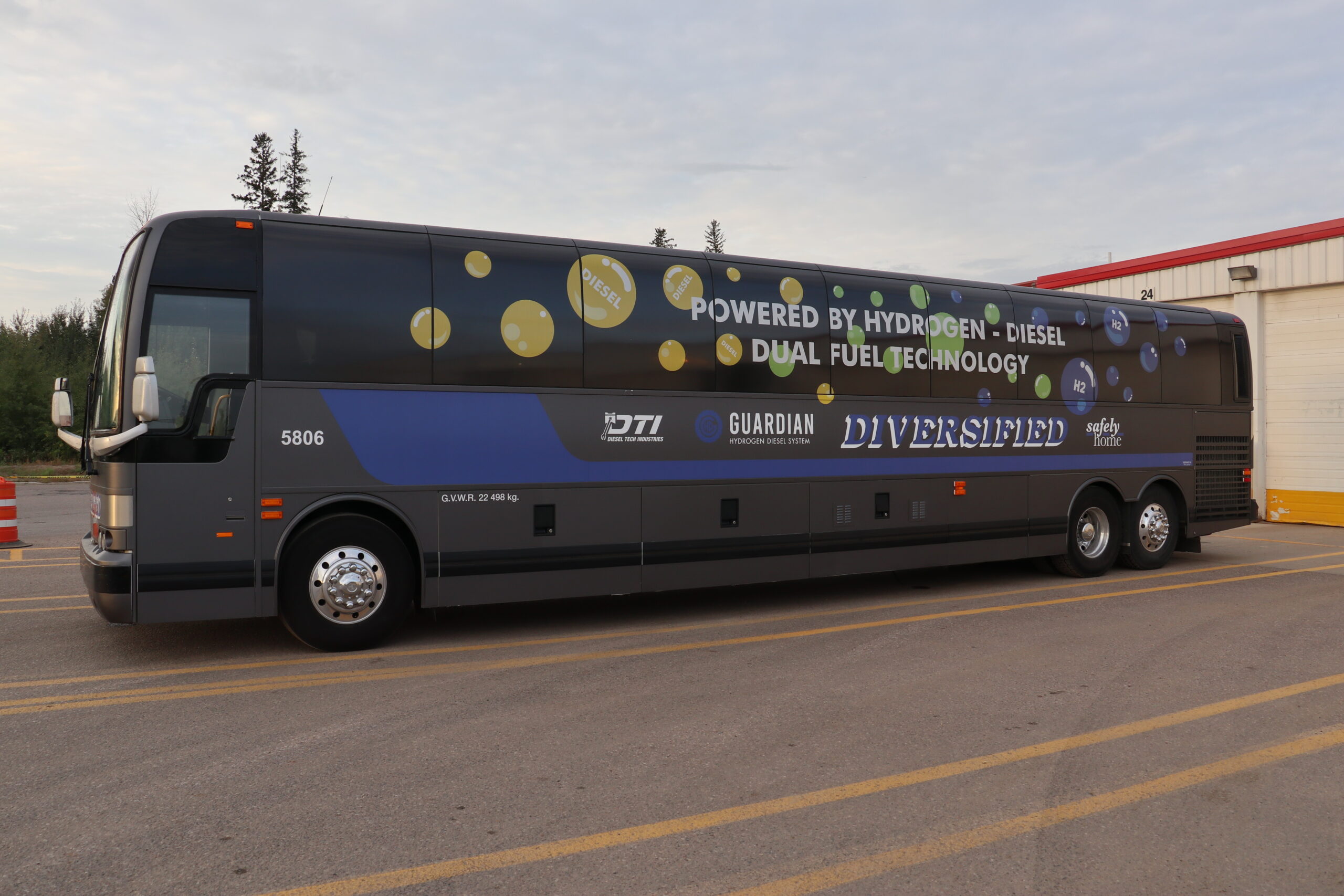Sustainability
PWT is focused on continually reducing emissions and minimizing environmental footprint. Environmental sustainability is an essential aspect of Pacific Western Transportation’s corporate culture.
The passenger transportation industry is inherently sustainable. As a leading provider of people transportation services in Canada, PWT is at the forefront of the global effort to get cars off the road in favor of more efficient modes of transit. Using innovative thinking and state-of-the-art technology, PWT is focused on continually reducing emissions and minimizing the footprint of our operations.
Evolving alternative fuel advancements have the potential to revolutionize the transportation industry and our dependencies, investments, and environmental impact. PWT prioritizes the diversity of fleet fuel capabilities based on available technologies and continues to introduce these non-traditional fuel elements into our operations.
Propane:
PWT’s Student Transportation line of business has been utilizing propane as an alternative to diesel fuel since the 1980’s. We currently own and operate the largest propane-fueled fleet of school buses in all of Canada. As of 2020, this fleet has grown to a total of 850 buses! Not only is this initiative operationally viable, but it is a proven solution to reduce toxic emissions.
- By using propane buses, we have removed 3,229 metric tonnes of CO2e from entering the atmosphere in 2019 alone. That’s equivalent to preventing 686 passenger vehicles from being driven for a year.
- Our propane fleet helps us reduce Greenhouse Gas Emissions by 44% when compared to diesel.
- In the event of a leak, propane becomes a vapor that does not contaminate the soil, air, or aquifers.
- Propane emits 60% less carbon monoxide than gasoline, 98% less particulate matter than diesel, and contains virtually no sulfur.

PWT’s Student Transportation line of business ranks as the largest propane fleet of school buses in Canada: our propane fleet acquisition and expansion required the creation of new training programs for both maintenance personnel and operators. It also required significant additions to the current infrastructure to expand its refueling capacity.
As a private school bus contractor, we are the second-largest propane fleet in North America: because of the nature of the precious cargo we carry Safely Home, every day, we have a constant reminder of what truly matters. This is why we are dedicated to creating a sustainable future for our planet, and why it’s at the forefront of our day-to-day operations.
Our fleet of propane vehicles has contributed to the market expansion of proven clean fuel: the use of propane as alternative vehicle fuel resulted in the revision of Canadian legislation and standards, namely MVSR, CMVSS, NSCS, and CSA D250-16. Changes have also been introduced to Canadian legislation so propane can be easily dispensed at fueling stations across the country.
Propane buses were brought in because of their potential to become an efficient alternative to diesel fuel: in 2017, overall school bus sales in North America show propane as the most popular alternative fuel accounting for 6% of the market. The Alberta Energy Regulator forecasts propane’s demand will continue increasing from 2018 to 2025 by 14%.
Hydrogen Dual Fuel:
Pacific Western Transportation is committed to reducing greenhouse gas emissions, which is why we have partnered with Diesel Tech Industries to implement the Guardian Hydrogen-Conversion System. This new technology can take an existing diesel engine and add an adaptation so it can accept hydrogen as a secondary fuel source. Hydrogen is a more self-sustaining and effective fuel that provides incredibly clean emissions.
Access to safe and reliable transportation is an essential service in our modern society, and providing that resource to our customers in a sustainable way has never been more important. The Guardian Hydrogen-Conversion System allows PWT to maximize our existing fleet capital in a responsible manner.

Environmental, Social and Governance (ESG) Position Statement
Pacific Western Group of Companies (“PWT”) recognizes that Environmental, Social and Governance (“ESG”) factors represent both risks and opportunities for our business and key stakeholders – including our employees, customers, partners, and the communities in which we operate. We recognize that the way that we manage ESG factors has a direct link to the success of our business given the importance of ESG factors to the global transportation industry. As a leading provider of people transportation services in Canada, we are committed to doing our part to support positive environmental and social outcomes within the communities we serve.
Our Mission, Vision, and Core Values provide the framework that underpins our ESG approach. In conducting our business, our Core Values serve as a set of principles that define us as an organization, guiding every action and decision made by our people and informing and supporting everything we do.
Mission
To exceed customer expectations by employing talented people who share in the dedication of a company committed to Safety and Service.
Vision
We will grow a sustainable people transportation company through innovation, relationships, and our core values.

Our ESG Commitment
With our vision to grow a sustainable people transportation company, we believe that the integration of ESG factors into our corporate strategy is fundamental to our long-term success. Driven by the dual global imperatives to address climate change and achieve the UN Sustainable Development Goals (“SDGs”), we recognize the vital role that the transportation sector plays in enabling the transition to a low carbon global economy and in driving sustainable real-world outcomes. Through our ESG Commitments, safety will remain our first core value, and is at the heart of all we do.
We also recognize that transparency and accountability is critically important to drive meaningful results. To this end, we are committed to adopting leading ESG reporting frameworks, such as the Sustainability Accounting Standards Board (“SASB”) Standards and the recommendations of the Task Force on Climate-related Financial Disclosures (“TCFD”) to provide this transparency to our key stakeholders.
Our ESG Approach
Our approach to ESG is guided by the following strategic pillars. These pillars are focused on the ESG risks and opportunities that we believe have the greatest potential to impact our value and performance, as determined by a formal ESG materiality assessment. These pillars are of the utmost importance to our key stakeholders, including employees and customers.
- Continue to strive for health and safety excellence for our people and passengers through our Safely Home program
- Support our people to foster an inclusive workplace culture and maintain a healthy, engaged, and diverse workforce
- Strive to reduce greenhouse gas (“GHG”) emissions across all our lines of business
- Seek opportunities to improve our governance structures to enable the effective oversight and management of our material ESG factors
- Strengthen our relationships and ties with the communities in which we operate, including our Indigenous partners and stakeholders
To support these strategic pillars, we expect that everyone at all levels of the organization embody the responsibilities and commitments shared in this document. We expect our senior leadership team, onsite managers, supervisors, employees, and, to the extent feasible, contractors of PWT to support our objective to integrate ESG into our business by upholding our commitments to:
- Enhance our understanding of the impacts of ESG across our lines of business and integrate ESG factors into our long-term strategic planning
- Ensure sufficient budget allocation to maintain regulatory compliance on ESG factors and meet the evolving needs and expectations of our key stakeholders
- Aim to capture ESG opportunities, including assessing and deploying new technologies to improve our ESG performance
First Nations Partnerships
Pacific Western Transportation is proud to partner with multiple First Nations and Indigenous organizations. Together, we have built successful relationships through a shared vision of economic and community development while simultaneously promoting each Nation’s sustainability. Diversified Transportation is the Fort McMurray First Nation Group of Companies’ employee and contractor transportation partner. The partnership has provided Diversified with the ability to support community construction projects and assist with socioeconomic programs within the region.
Diversified BC has partnered with the Gitga’at Nation to provide site transportation for the Kitimat Liquid Natural Gas Project in British Columbia and surrounding construction projects. Gitga’at Diversified Employee Transportation Ltd provides Gitga’at members with a unique opportunity to start a career in transportation. Southland Saskatchewan and the George Gordon First Nation have launched a successful joint venture in the Saskatoon, Regina, and Humboldt areas. Wicehtowak Employee Transportation Ltd provides employee transportation services to BHP Billiton and the natural resource sector throughout the province.
Pacific Western Transportation has also developed rewarding partnerships with several other Indigenous groups across Canada, including the Netmizaaggamig Nishnaabeg First Nation in Ontario, the Saulteau and Peters First Nations in British Columbia, and the Montana First Nation in Alberta.

Governance
PWT’s approach to ESG is underpinned by a governance framework that enables effective oversight and management of ESG risks and opportunities. The CEO has oversight responsibility for reviewing ESG-related management strategies, performance, and investment decisions related to ESG, including those related to climate change. The President and COO is responsible for ESG and has the highest level of management accountability for ESG issues, including climate-related risks and opportunities, and reports to the Board of Directors on ESG-related matters semi-annually. We are committed to maintaining strong governance structures that incorporate ESG considerations and, over time, bolstering our governance structures to exemplify leading ESG practices. Our Safety Council and Maintenance Excellence Committee will remain foundational to elements of our management and oversight of safety and service as a core business and ESG priority.
Risk Management
We are committed to enhancing the integration of ESG risks into our risk management processes to ensure that the unique and evolving nature of ESG risks, including climate-related risks, is appropriately assessed. Moving forward, we will leverage the results from our bi-annual ESG materiality assessments to help us identify and mitigate ESG-related risks over the short, medium, and long-term, and supplement efforts underway to embed ESG across PWT.
Metrics and Targets
We are committed to collecting, monitoring, and disclosing key ESG metrics to provide insight into our ESG performance and progression. Work is currently underway to enhance our disclosure on key metrics related to the ESG factors that have the most potential to impact PWT, as identified by our 2021 ESG materiality assessment. These metrics will be informed by the SASB Standards and the TCFD recommendations and will be provided in future disclosure.
As we continue to improve our ESG data collection and reporting processes over time, we will further evaluate the feasibility and relevance of setting ESG targets to ensure that we are accountable for advancing our ESG strategy over time.
Reporting and Disclosure
We will strive to continually improve our ESG and climate change reporting to our key stakeholders to enhance transparency on our ESG risks and opportunities, strategy implementation, and overall performance. As leading standards and frameworks for ESG- and climate-related disclosure, we aim to align our future disclosures with relevant SASB Standards, as well as the TCFD recommendations using a phased approach over time.
